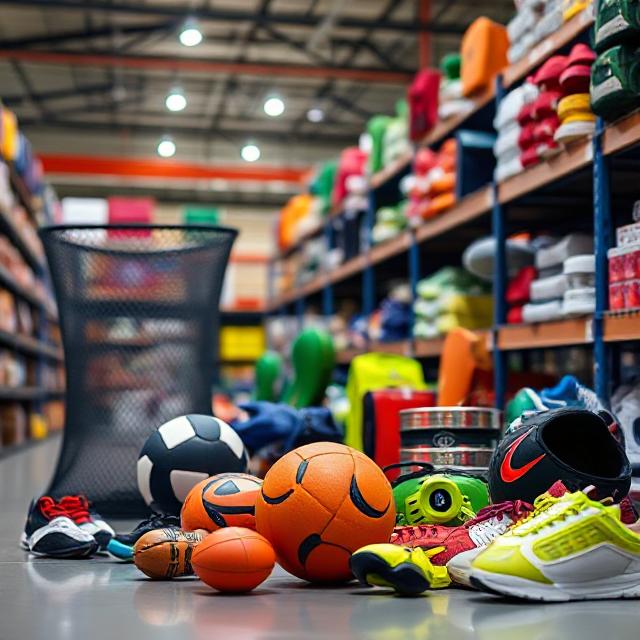The British sports goods industry has experienced remarkable growth in recent years, driven by increased health consciousness, government fitness initiatives, and the enduring legacy of major sporting events including the London 2012 Olympics and the Commonwealth Games. For businesses operating within this dynamic sector, understanding wholesale sports goods opportunities requires careful analysis of consumer trends, seasonal demands, and the unique characteristics that define British sporting culture.
This comprehensive examination explores market dynamics, regional preferences, and strategic considerations that shape successful wholesale sports goods operations across England, Scotland, Wales, and Northern Ireland.
The Evolution of British Sports Culture and Wholesale Demand
Britain’s relationship with sport extends far beyond professional competitions, encompassing school programs, community clubs, fitness trends, and recreational activities that create diverse wholesale opportunities. The nation’s sporting heritage spans traditional pursuits like cricket and rugby to emerging activities including paddle boarding and outdoor fitness bootcamps.
The shift towards active lifestyles has created sustained demand across multiple sports goods categories, from basic fitness equipment to specialized performance wear. This cultural movement mirrors trends observed in other wholesale sectors, including wholesale apparel uk markets, where lifestyle changes drive purchasing decisions and inventory requirements.
Consumer behavior patterns in UK sports retail demonstrate strong correlations with seasonal activities, school calendars, and major sporting events. Unlike fashion-driven categories such as wholesale clothing, sports goods often serve specific functional purposes with longer replacement cycles, requiring different strategic approaches to inventory management and customer relationships.
Understanding B2B Wholesale Dynamics in Sports Goods
The B2B wholesale model provides essential advantages within the sports goods sector, where product performance, safety standards, and technical specifications carry critical importance. Wholesale suppliers offer quality assurance, compliance management, and market intelligence that individual retailers often cannot develop cost-effectively.
Working within a wholesale marketplace environment enables sports goods retailers to access comprehensive product ranges spanning multiple disciplines without managing complex international supply chains directly. Many UK wholesale suppliers maintain relationships with manufacturers across Asia, Europe, and North America, providing retailers with products that meet British safety standards and performance expectations.
The sports goods wholesale sector shares characteristics with other specialized industries, including elements observed in garments suppliers uk operations. Both sectors emphasize technical performance over purely aesthetic considerations, require understanding of materials science and construction techniques, and serve customers who prioritize functionality alongside value for money.
Regional Variations and Sporting Traditions
Understanding regional sporting preferences and participation patterns proves essential for successful wholesale sports goods operations across the United Kingdom. Northern England, including wholesale in manchester catchment areas, demonstrates strong demand for football-related products, reflecting the region’s passionate football culture and numerous professional clubs.
Scotland’s sports goods market emphasizes outdoor pursuits including hiking, climbing, and water sports, driven by the country’s dramatic landscape and outdoor recreation traditions. Golf equipment and accessories maintain particular significance, with Scotland’s golfing heritage creating sustained demand for quality products across all skill levels.
Wales shows strong demand for rugby-related equipment and outdoor adventure gear, reflecting both national sporting pride and the principality’s mountainous terrain. The growth of adventure tourism has further increased demand for hiking, climbing, and cycling equipment throughout Welsh markets.
London and the South East focus heavily on fitness and lifestyle sports, including gym equipment, running gear, and emerging activities like yoga and Pilates accessories. The capital’s diverse population and high disposable income levels create opportunities for premium and specialized sports products.
Seasonal Patterns and Activity Cycles
Sports goods wholesale operates on complex seasonal cycles that blend traditional sporting calendars with fitness trends, school requirements, and weather-dependent activities. Understanding these patterns enables retailers to optimize purchasing decisions and inventory investments throughout the year.
Spring represents renewal and outdoor activity preparation, driving demand for cycling equipment, running gear, and outdoor sports accessories. School sports day preparations create specific opportunities for athletics equipment and team sports supplies during this period.
Summer emphasizes outdoor pursuits and holiday activities, with camping gear, water sports equipment, and festival accessories experiencing peak demand. The extended daylight hours and warmer weather encourage participation in outdoor activities that require specialized equipment and clothing.
Autumn brings traditional team sports seasons, particularly football and rugby, creating demand for training equipment, team supplies, and spectator accessories. Back-to-school periods generate significant sales for PE equipment and sports uniforms across primary and secondary education sectors.
Winter sports activities, while limited by Britain’s climate, still create demand for indoor fitness equipment as outdoor activities become less appealing. The period also sees increased gym membership and home fitness equipment sales as people maintain exercise routines during darker months.
The Intersection with Apparel and Fashion Wholesale
Sports goods increasingly intersect with fashion trends, creating opportunities for retailers who understand both performance requirements and style preferences. Athletic wear has transcended purely functional applications, with consumers wearing sports clothing for casual and lifestyle purposes beyond active participation.
This convergence creates opportunities for retailers experienced in fashion wholesale uk operations to expand into sports apparel categories. Technical fabrics, moisture-wicking properties, and performance features increasingly appear in casual clothing, blending sports functionality with everyday fashion appeal.
The athleisure trend has particularly benefited from this intersection, with consumers seeking clothing that transitions seamlessly between gym activities and social situations. Wholesale suppliers who understand both technical performance requirements and fashion sensibilities can serve this growing market segment effectively.
Children’s sports wear represents another area where sports goods intersect with kidswear wholesale considerations. School PE requirements, after-school sports programs, and youth team participation create sustained demand for boys clothes and girls’ sports apparel that combines performance with durability and value.
Product Categories and Market Segments
The wholesale sports goods sector encompasses numerous distinct categories, each requiring different strategic approaches and supplier relationships. Team sports equipment, including footballs, rugby balls, and cricket gear, represents traditional strengths within the UK market driven by established sporting cultures.
Individual fitness equipment has experienced significant growth, particularly following increased home fitness adoption during recent years. This category includes everything from basic dumbbells to sophisticated home gym systems, serving consumers across various fitness levels and space constraints.
Outdoor adventure equipment appeals to Britain’s growing outdoor recreation community, with hiking boots, camping gear, and cycling accessories maintaining steady demand throughout the year. This segment often requires technical expertise and quality assurance that established wholesaler uk businesses can provide.
Specialist sports categories, including martial arts equipment, swimming accessories, and niche sporting disciplines, offer higher margins but require more focused customer bases and technical knowledge. These categories often develop loyal customer communities that value expertise over purely price-based considerations.
Safety Standards and Quality Assurance
Sports goods wholesale requires exceptional attention to safety standards, performance specifications, and regulatory compliance. Unlike purely aesthetic products found in much wholesale clothing, sports equipment directly affects user safety and performance, creating significant quality assurance responsibilities.
British Standards and European CE marking requirements ensure products meet minimum safety criteria, but consumer expectations often exceed these basic requirements. Established UK wholesale suppliers typically provide additional quality testing and performance validation that protects retailers from liability issues.
Product recall procedures and quality control systems become particularly important in sports goods wholesale, where equipment failure can result in injury and legal consequences. Wholesale suppliers with comprehensive quality management systems offer valuable protection and peace of mind to retail partners.
Insurance and liability considerations affect both wholesale suppliers and retailers, with product liability coverage essential for sports equipment that could potentially cause injury if defective. Understanding these requirements helps retailers select appropriate wholesale partners and manage business risks effectively.
Technology Integration and Performance Innovation
The sports goods wholesale sector naturally embraces technological advancement, with products increasingly incorporating smart features, advanced materials, and performance monitoring capabilities. These innovations create opportunities for retailers who understand both technical specifications and consumer benefits.
Wearable technology integration has transformed traditional sports accessories, with fitness trackers, smart watches, and connected equipment providing performance data and motivation features. Wholesale suppliers who offer these advanced products can serve tech-savvy consumers seeking comprehensive fitness solutions.
Advanced materials science continues improving sports equipment performance, with lighter, stronger, and more durable materials enhancing user experience across multiple categories. Understanding these material advances enables retailers to explain product benefits and justify premium pricing for superior products.
Digital integration extends beyond individual products into retail operations, with inventory management systems, customer tracking, and performance analytics helping sports goods retailers optimize their operations and customer service.
Sustainability and Environmental Consciousness
Environmental considerations increasingly influence sports goods purchasing decisions across the UK market, with consumers seeking products that minimize environmental impact whilst maintaining performance standards. This trend affects both wholesale supplier selection and retail customer preferences.
Recycled materials and sustainable production methods appeal to environmentally conscious consumers whilst maintaining product performance characteristics. Some wholesale suppliers now specialize in eco-friendly sports products that command premium pricing but serve growing market segments focused on environmental responsibility.
Durability and longevity considerations have gained importance as consumers seek value beyond initial purchase price whilst reducing environmental impact through extended product lifecycles. Quality construction and repairable designs enable retailers to serve sustainability-conscious customers effectively.
Local sourcing and reduced transportation footprints appeal to consumers supporting domestic manufacturing and reduced carbon emissions. UK wholesale suppliers who emphasize British manufacturing and traditional craftsmanship can differentiate their products in competitive international markets.
Cross-Category Opportunities and Market Expansion
The sports goods wholesale sector offers opportunities for retailers operating in related categories, including those experienced in united kingdom wholesale clothing and fashion accessories. Understanding these cross-category connections enables business expansion and enhanced customer service.
Sports team merchandise and fan accessories create seasonal opportunities that complement equipment sales, particularly during major tournaments and local team successes. These products often bridge the gap between sports functionality and fashion expression.
Corporate wellness programs and workplace fitness initiatives represent growing market segments that require bulk purchasing arrangements and specialized product selections. Retailers who understand both sports equipment and business-to-business sales can serve these emerging opportunities.
The fancy dress and costume market occasionally intersects with sports goods through themed parties and Halloween costumes featuring sports personalities and team uniforms. While Halloween costumes typically involve replica rather than functional items, understanding these connections can create additional revenue opportunities.
Future Trends and Market Evolution
The UK sports goods wholesale market continues evolving in response to changing participation patterns, technological advances, and demographic shifts. Virtual reality integration and gamification represent emerging categories where traditional sports equipment meets digital entertainment requirements.
Home fitness solutions continue expanding beyond traditional gym equipment to include compact, versatile products suitable for smaller British homes. This trend creates opportunities for wholesale suppliers who understand space constraints and multi-functional design requirements.
Mental health awareness increasingly influences sports equipment design and marketing, with products emphasizing stress relief, mindfulness, and overall wellness rather than purely physical performance. These applications expand market reach beyond traditional sports participants.
Personalization capabilities, enabled by digital printing and customization technologies, allow consumers to create unique sports equipment that reflects individual preferences and team affiliations. Wholesale suppliers investing in customization capabilities can offer retailers distinctive competitive advantages.
Conclusion
The wholesale sports goods market in the United Kingdom presents substantial opportunities for retailers who understand sporting culture, seasonal patterns, and evolving consumer preferences. Success requires strategic supplier relationships, technical expertise, and comprehensive understanding of safety requirements and performance standards.
By leveraging modern wholesale marketplace platforms and developing expertise in specific sports categories, retailers can build sustainable businesses that serve diverse customer needs from grassroots participation to elite performance. The key lies in balancing technical functionality with commercial viability whilst maintaining flexibility to adapt to changing participation patterns and consumer expectations.
The continued growth of health consciousness, outdoor recreation, and fitness culture throughout Britain suggests that well-positioned wholesale sports goods businesses will find expanding opportunities across multiple market segments and demographic groups throughout the United Kingdom.

